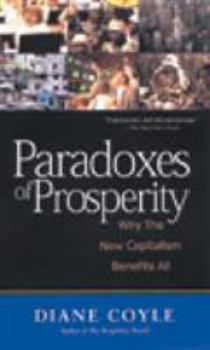Paradoxes of Prosperity: Why the New Capitalism Benefits All
Select Format
Select Condition 
Book Overview
Diane Coyle brings us a book about why the New Economy with its prospect of improved productivity, faster growth, greater riches and full employment is causing an anti-globalization and... This description may be from another edition of this product.
Format:Paperback
Language:English
ISBN:1587991454
ISBN13:9781587991455
Release Date:September 2002
Publisher:W. W. Norton & Company
Length:316 Pages
Weight:1.05 lbs.
Dimensions:1.0" x 5.9" x 8.7"
Customer Reviews
3 ratings
My impression about this book.
Published by Thriftbooks.com User , 19 years ago
I will probably fail miserably if I attempt to make a learned analysis of this book, rather, I will share my impression on this work (purely subjective) with whomever cares to read this review. I found this book by Diane Coyle exquisite. I am no fan of Capitalism, yet, found her arguments very persuasive and full of common sense. I have an already admitted weakness for books of this sort (economic related matters for the layman). Ms. Coyle makes a powerful argument of why the new brand of Capitalism will be good for the masses after a transitional period and why it will remove from power most of these days' entrenched powers that be. This book is worth your time and money. Enjoy it. Somehow related to it is another good book I am reading at this time that is entitled: The Sovereign Individual (James Dale Davidson and Lord William Rees-Mogg)
Highly Recommended!
Published by Thriftbooks.com User , 22 years ago
Diane Coyle, a consultant and columnist, presents an in-depth and optimistic look at modern capitalism. Dubbing our current age a transitional period, she predicts that the result of our recent bout of high-tech fueled economic growth will be even more growth and a better society. Coyle refers to historical parallels and many texts to make her case that technology has transformed society in significant ways that even experts are only beginning to understand. We [...] recommend this compelling and authoritative book to executives and managers, and to serious readers and academics, all of whom will enjoy the way it makes sense of today's contradictory financial and social developments.
COyle enters the ranks of the greats
Published by Thriftbooks.com User , 22 years ago
Paul Krugman. Bradford De Long. There are few economists able to make complex ideas sing for the general reader. With her latest book The Paradoxes of Prosperity, her follow-up to 1999's The Weightless World, Diane Coyle has entered their ranks.That the book succeeds so well is a testament to Coyle's ability to keep two conflicting ideas in the reader's head at the same time. Thus the central, unwritten paradox at the heart of the book: she is a whistleblower on the whole global capitalism game while managing at the same time to be its strongest champion.What makes Coyle so engaging is her fearlessness in grappling with the very biggest concerns of our times: Is free-market economics really the only game in town? What is the role of government? What is the future of the nation state? What do you do about inequality? Inevitably there are no glib answers to these questions, and the core of the book is given over to Coyle's explanation for a series of paradoxes: Wealth generation is good, but relies on change, which people don't like. Why, in a weightless world, have places become more important than ever? Why is it that the technology that permits empowerment and has the potential to boost democratic control is in fact generally felt to be disempowering and facilitating central control? Why do we have a love-hate relationship with government in which we value certain services but vote for tax-cutting platforms? She tackles these issues with huge verve and intelligence.There are any number of reasons to like Coyle. For one thing, she walks the walk. She argues that new companies must speak to the heart and head (p166) and she does exactly that in her text: how can you not like a heavyweight economist who admits to having been an adolescent cooped up in a darkened room listening to the Clash? She follows her own Just Do It advice by setting up her own company, Enlightenment Economics. She has an exquisite feel for the apposite anecdote and the telling example. So, when arguing that physical assets are not as important for a company as its `network' or licensing assets, as well as the obvious example of Nike she mentions Topsy Tail, a $100 million hair products company which has three employees. And while she can be wonderfully breathy ("The struggle is now on for the distribution of the benefits that will be generated by a surge in prosperity thanks to economic growth driven by the new technologies"), she has a great line in invective: "A lot of management advice is of course complete twaddle. Empty intellectual calories pandering to the hunger for advice of managers aware of the pressures for change".The Paradoxes of Prosperity is a no-holds-barred riposte to anti-globalists, luddites and those who believe in the need for worldwide economic change but reject capitalism as the engine for doing so. She is quick to point out the obvious paradox that anti-globalisation campaigners are globalisation's biggest beneficiaries, and the les




